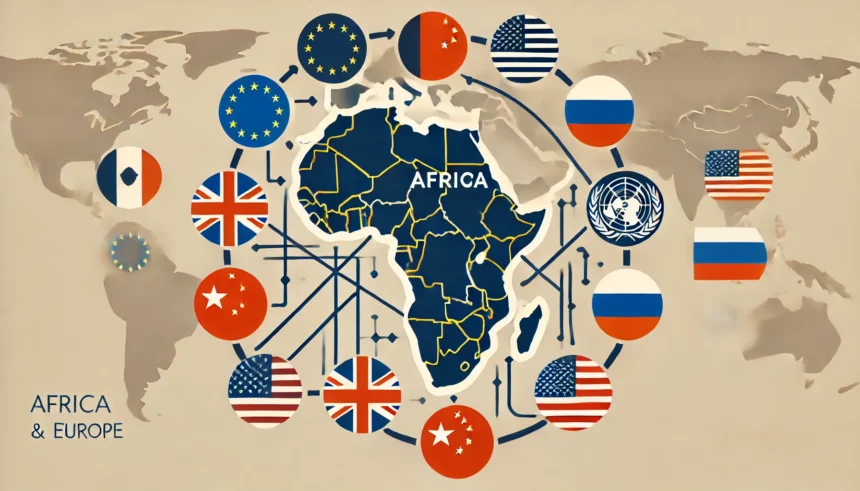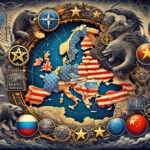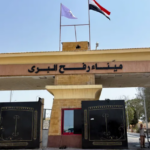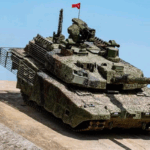Senén Florensa’s paper explores the complex and evolving dynamics of Africa-Europe relations within a changing global geopolitical landscape. The discussion is framed around the transition from a unipolar world dominated by the United States to a multipolar world with shifting alliances, competing powers, and new geopolitical priorities. The main emphasis is on how Africa and Europe are recalibrating in response to these developments, particularly highlighting the influence of China, Russia, and the BRICS nations on Africa.
Global Geopolitical Transformations: An Emerging Global Order
The unipolar world order, formed post-Cold War and led by the United States, is experiencing significant transformation. The ascendance of China, a resurgent Russia, and the increasing clout of emerging countries are undermining the current power dynamics.
The ascendance of China has intensified competition with the United States for global supremacy, especially in economic and political domains. The growing aggressiveness of China in Africa and other places is transforming global alliances.
Russia has re-emerged in the geopolitical arena, particularly in Africa, after a period of relative absence during the Cold War, through strategic military and economic initiatives.
The BRICS coalition (Brazil, Russia, India, China, and South Africa) is establishing itself as a representative of the Global South, promoting a multipolar global order. Recent expansions to incorporate Iran, Egypt, Saudi Arabia, and the UAE indicate a geopolitical initiative to counteract the dominance of the G7 and Western nations.
The emerging geopolitical landscape is intensifying the fight for influence in Africa, as the continent’s riches, strategic positions, and expanding population render it a crucial arena for global powers.
Africa’s Ascendant Role: Strategic Significance and Potential
Africa’s significance in global geopolitics is increasing because of its population and economic potential.
Demographics: By 2050, Africa is anticipated to comprise 25% of the global population, with a substantial segment being youth. This demographic expansion offers both prospects and obstacles, especially regarding employment, social stability, and migration.
Africa’s extensive mineral reserves, encompassing rare earth elements and strategic minerals, are crucial for various industries, including electronics and renewable energy. Africa is an essential collaborator in global supply chains.
Africa’s 54 member states wield considerable voting power in the United Nations General Assembly and many international organizations. This has prompted global powers to seek African backing for their geopolitical objectives.
Africa’s political landscape is characterized by governance deficiencies, instability, and conflicts. These challenges hinder its capacity to fully exploit its strategic significance in global discussions.
The BRICS in Africa: Opportunity or Neo-Colonialism?
The BRICS coalition is frequently depicted as a substitute for Western-centric institutions, offering more equal collaborations for emerging nations. Nonetheless, the situation is more intricate:
The expansion of BRICS with the admission of nations such as Iran, Egypt, and Saudi Arabia has augmented the bloc’s geopolitical significance. The expanded BRICS represents 46% of the global population and 36% of worldwide GDP. Their dominance of global resources, such as 54% of world oil output, enhances their influence in international economic matters.
China’s Preeminence: China’s substantial economic influence (70% of BRICS GDP) prompts apprehensions regarding its supremacy within the coalition and its genuine objectives in Africa. China’s commerce with Africa predominantly consists of exporting manufactured commodities and buying raw materials, reflecting historical colonial trade dynamics.
Russia’s Influence: Russia’s involvement in Africa is predominantly militaristic, employing mercenary organizations like Wagner to assert influence in volatile areas. This method, although successful in establishing strategic alliances, frequently intensifies local tensions and instability.
A Diverse Array of Outcomes for Africa: Although BRICS discourse highlights South-South cooperation, in reality, African nations may become ensnared in inequitable partnerships that favour the interests of dominant BRICS members, notably China and Russia.
Strategic Interests and Policy Responses of Europe
The relationship between Europe and Africa is profoundly historical, influenced by colonial legacies and post-colonial cooperative frameworks. Nonetheless, the evolving geopolitical situation and rivalry from other nations have necessitated a reassessment of Europe’s strategy:
Common Challenges and Opportunities: Europe and Africa are interconnected via geography, history, and economic connection. The elderly population of Europe and the youthful demographic of Africa have complemented demands for labour markets and economic development.
The EU has initiated the Global Gateway Programme as its premier development program in Africa, committing €150 billion over a span of seven years. This is perceived as a response to China’s Belt and Road Initiative, emphasizing infrastructure, digital transformation, climate resilience, and governance.
Migration and Security: Europe is profoundly apprehensive regarding instability in Africa, which propels migration and exacerbates extremism. The EU’s policies have progressively concentrated on regional stabilization via security collaboration, economic advancement, and governance changes.
The EU aims to establish itself as Africa’s preferred partner, highlighting common values, sustainable development, and reciprocal economic advantages. Europe confronts difficulties in addressing the ramifications of its colonial history and contending with China’s unconditional aid paradigm.
Africa-Europe Relations: A Partnership at a Critical Juncture
The future of Africa-Europe relations will hinge on the capacity of both continents to establish a partnership founded on mutual respect, common values, and strategic alignment. Principal themes encompass:
Migration Management: Europe’s emphasis on restricting migration via security measures frequently conflicts with Africa’s developmental objectives. A more equitable strategy that tackles fundamental issues, such as poverty and unemployment, is essential.
The African Continental Free Trade Area (AfCFTA) gives a substantial opportunity for Europe to facilitate intra-African commerce and industrialization, therefore aiding in job creation and economic stability.
Shared Security: The ascendance of jihadism and the escalation of crises in the Sahel and other areas provide a direct menace to European security. Augmented collaboration on counter-terrorism and regional stability is important.
The EU’s recent policy, outlined in the 2020 Joint Communication and the 2022 AU-EU Summit, is to establish a more comprehensive and equitable alliance. This entails synchronizing European investments with Africa’s development aspirations and establishing structures for enhanced political and security collaboration.
Rival Powers and African Agency
African nations are increasingly expressing their autonomy in shaping their own trajectories, notwithstanding the interests of other powers. This is apparent in their selective involvement with BRICS, the EU, and additional partners. Essential elements comprise:
Expanding Alliances: Numerous African nations are striving to broaden their partnerships to prevent excessive reliance on any singular force. This involves fortifying relationships with growing nations such as India and Brazil, in addition to collaborating with regional powers like Turkey.
Regional Integration: Regional economic communities, such as ECOWAS and SADC, are more influential in fostering economic integration and political stability. The African Union’s activities to execute the AfCFTA and other continental projects seek to augment Africa’s negotiating leverage in international discussions.
African leaders are increasingly advocating for strategic autonomy, opposing foreign interference while pursuing alliances that coincide with their developmental objectives.
Conclusion:
The study asserts that the relationship between Africa and Europe is at a critical juncture. Africa is broadening its alternatives and expressing its autonomy, but Europe continues to be its primary partner in trade, investment, and sustainable development. Europe faces the task of providing a relationship that honours Africa’s ambitions and tackles shared issues in an evolving global landscape. The efficacy of the EU’s Global Gateway Programme and other initiatives will be pivotal in shaping the future direction of Africa-Europe relations.
Read the full article below.







